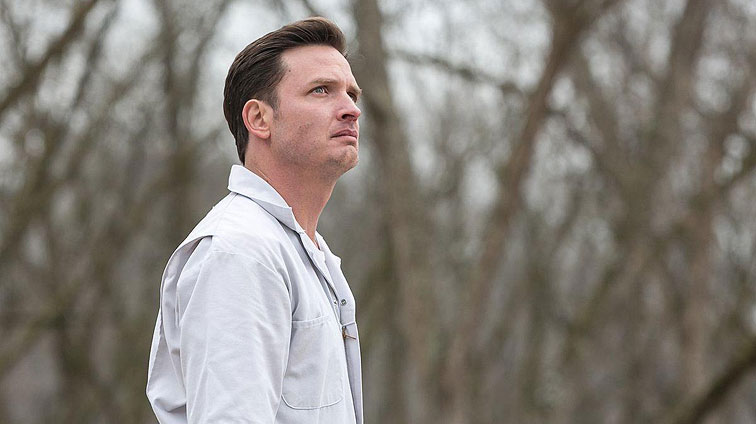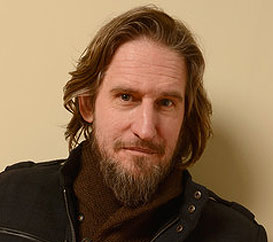
Lost and Found
Ray McKinnon, creator of the SundanceTV’s character drama Rectify, artfully wanders in the dark space between concrete notions of justice and closure and the fickle illusiveness of real life.
 Ray McKinnon
Ray McKinnon
Sometimes writers get trained by the system that we always need to know what [a character] is doing…So part of what we try to do is pull out dialogue and make it subtext.
SundanceTV’s character drama Rectify, now in its second season, is more than its logline: a man condemned to death row as a teen for the rape and murder of his girlfriend returns home after 19 years when DNA evidence wins his release. Great dramatic potential, yes, but the show is even better. Like the best television being made today, Rectify uses its premise as a spine from which a whole world of subtle, complex human characters and themes finger out organically into the dark.
Rectify was created by Ray McKinnon, an actor, writer and director best know for appearances in films like The Blind Side and O Brother, Where Art Thou? as well as notable small screen stints on Sons of Anarchy and Deadwood. McKinnon doesn’t sound like a “TV guy”—he doesn’t talk too fast or too much, instead resting calmly on a wry, weathered wit and the gravitas of someone who has known sadness and pain.
Similar weight is borne by the show’s lead character Daniel Holden, played by Aden Young, who navigates a post-prison world he struggles to understand. Hated and loved, guilty and innocent, lost and found—Holden embodies the core existential quandaries upon which the series is based. Breaking Bad alums Melissa Bernstein and Mark Johnson are EPs on the show and, while Rectify does not rely as much on violence and visceral danger, it possesses similar deftness for character and narrative.
McKinnon says he revels in the chance to do on television what film used to do, most quintessentially in the 1970s. Just as Rectify explores people’s need to have definite answers—closure and “justice”—to all things, his narrative avoids neatly tied up conclusions, preferring the power of reality’s nebulousness.
He spoke with the Writers Guild of America West website about how the tempo of television has taught him to use structure and collaboration more while still following his muse, and why, when Sundance bought a second, 10-episode season of Rectify, he was thrilled but had absolutely no idea where his story was going to go.
You conceived of the debut season of Rectify as a six-part story, spanning seven days. I’m curious if it caused you any creative anxiety when Sundance ordered a second 10-episode season or was it just exciting and you couldn’t wait?
There were five seconds of excitement and then the rest of it has been—what’s beyond anxiety - terror?
Yeah, I think that’s it.
At first you’re like, Now what? That’s always the way, right? I knew that we couldn’t do the first seven days of Daniel’s release again. That was off the table. So it’s, Now what? And then you just do the heavy lifting as it were. You just start imagining, talking and thinking and do the hard work, right?
So there was no like five-season arc in your mind for this show?
Oh no, no. Part of the reason we as humans write stories and are drawn to stories is that we’re seeking some kind of insight or closure to something. That’s why they have a beginning, middle and end. I was thinking about why people get wrongly convicted. It’s partly [due to] the pressure of having closure and having an end. Sometimes that causes people to lose sight of the truth. There’s so much pressure to they make things fit a narrative so that they can have order back in the world.
There’s a great parallel to the actual story here and your feeling about the creative process itself. You seem to be against absolute narrative structure and pat conclusions. Explain to me creatively how you like to handle the need for buttoned-up conclusions?
Well, the way of the world is we don’t always know what happened. There are still great mysteries all over the place. In storytelling, we wanna give the opposite, you know? We wanna leave feeling like something happened, we understood it, and there was closure to it. That’s usually the way that it goes. But I’m interested in the possibility—what if we don’t know, and we don’t find out what happened?
It’s more about the existential journey of our lead character and everybody around him, trying to make sense of the world and their past and their present. That’s far more interesting to me than creating a structure that’s going to have a definite finite kind of end.
And to that point, are you an extensive planner, outliner or how do you work?
I’m not a real big outliner. I haven’t been but in this kind of format, you do have to have more structure. You can’t just follow your bliss under this kind of schedule.
Right.
But I also like it when you’re in the middle of writing and your imagination takes you in a completely different direction. You don’t wanna be tied to structure to the point where you can’t flow when something unexpected happens.
So you’re definitely a follower of the muse when it comes?
Yes. If she/he’s around, I try to pay attention.
Has writing for TV changed your appreciation for the structural aspect?
I don’t know about appreciation. I know that it’s very difficult to continue to create week after week a story and continue to be original, especially when there are time constraints. You start feeling the power of convention and, you know, sometimes convention is good and other times it’s too conventional. So that’s the constant struggle doing television—balancing those two, the unconventional and the conventional.
Do you have any sort of rules of thumb or guidelines for that balance?
You can feel the unwitting pressure of the network and the people around you and you can start to think conventionally because that’s easier road to travel. The great thing about Sundance and TV right now, they’re not putting a lot of pressure on you to be conventional. I just remind whoever’s listening—every time we create a box, what we need to think about is, Do we need to break out of that box? That’s a conscious thing and sometimes it’s an unconscious thing. You know, it’s hard to get a hold of.
How do you like writing with a team in the writers’ room?
Yeah, it’s not everybody that can write every character the way that you see it, and there’s a lot of subtext in the show. Sometimes writers get trained by the system that we always need to know what [a character] is doing… And they get conditioned by that. So part of what we try to do is pull out dialogue and make it subtext.
So you have to deprogram them?
[Laughs] To some degree. These ones are pretty talented in their own right, so I just think they have to be properly indoctrinated… or improperly indoctrinated.
There’s a lot of series out there now that have cinematic and novelistic qualities. But a special characteristic of this series is its mournfully contemplative quality. Is that something you consciously conceived of doing at the outset or is it just the way it came out?
Mad Men was an example of a show that I felt had a similar quality, with a completely different kind of plot and characters. When I watched that, it was meditative, you know? It had tension but at the same time, it was like curling up to a wonderful novel, and I like that experience. But I didn’t consciously emulate it. It’s more of an intuitive feeling as I’m writing, as I’m experiencing the show in my head rather than saying I’m going to consciously write a show that has these traits. You have to be interested and pulled in by what you’re writing and so I didn’t think of it as contemplative, but I knew I was engaged.
That’s become a defining aspect to this era of television, the idea of consistency of authorship, trusting creators and writers like they have with you on this series.
Yeah, there are trends and what is old is new again. It’s just that vision or a specific kind of lens, is coming through now. Certain television shows [today] are more of what film used to be. Appreciators of story have a hunger for that. Some people already have a taste for it and some just haven’t been exposed to it. So it’s a great time in television. I like those kinds of shows, those are the shows I’m most drawn to and, at the end of the day, I’m really telling a story that I would like to see. That’s the only true guide I can go by because I can’t guess what you wanna see. Once I start doing that then, you know, it really becomes a mess. Now it’s just my mess.
© 2014 Writers Guild of America West
